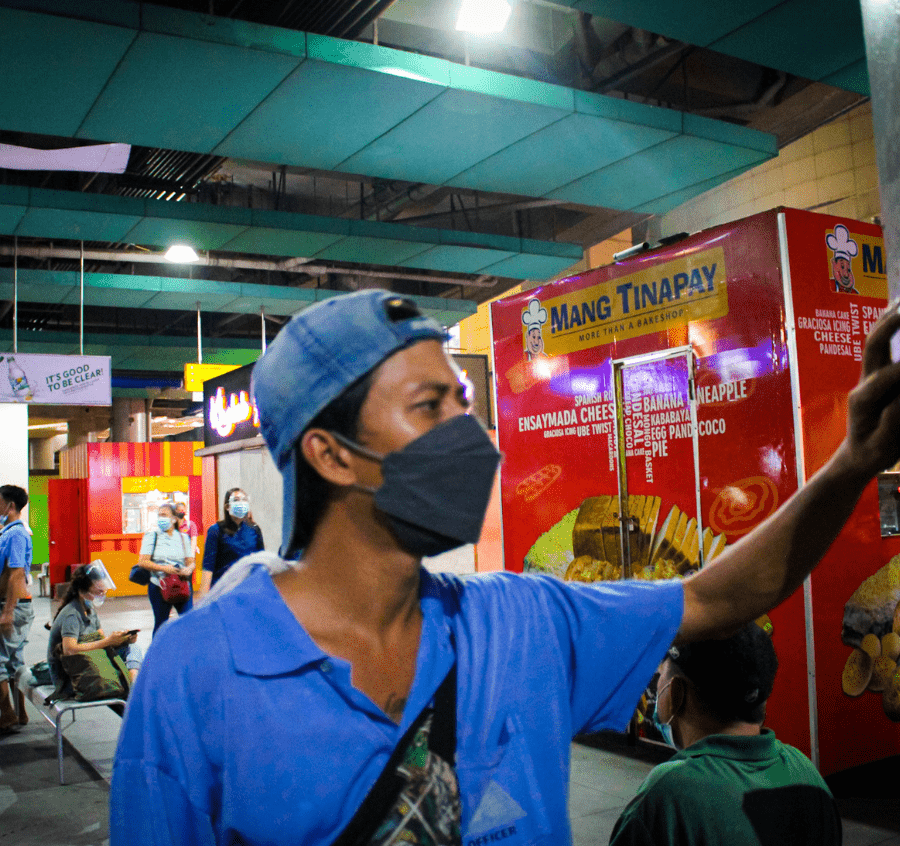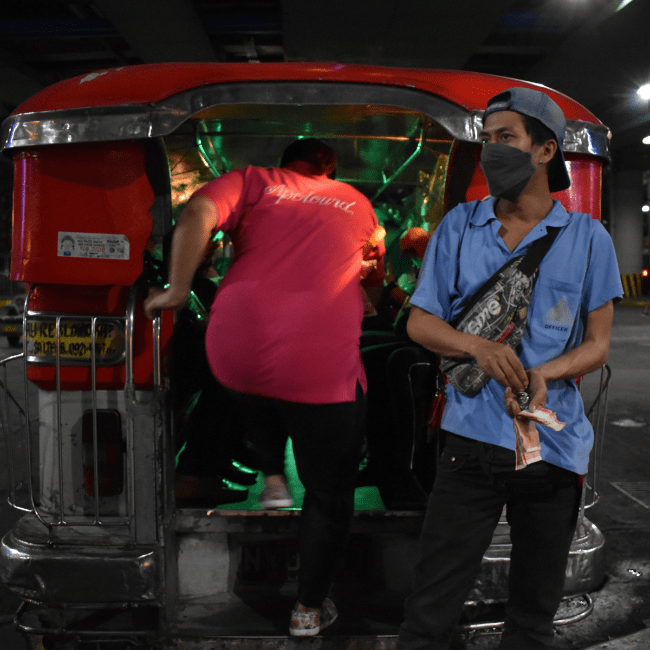The Voice of Routes and Destination

In the pedestrian lanes and terminal where jeepneys come to a halt, comes the screaming city’s landmark, Crisanto Cueto, trying to rise over the loud honking of the vehicles and the chatter of the busy passengers. Unlike singers who profit from their voices, he does not get half as much but is as persistent.
The public transport terminal at SM North Edsa has three public vehicle sections: jeepney, UV express, and Bus. The place is normally scorching, noisy, and usually congested. However, if you ask the local government and Filipino commuters, they’ll tell you it benefits them more than it causes inconvenience. Among its advantages, the public acknowledges its ability to help with a better traffic flow and safer waiting experience the most.

The jeepney terminal has only four barkers who call for and guide plenty of passengers. Aside from Cubao, SM North Edsa is also known as one of the prime locations in the town of all sorts. There are seven destinations with over 30 operational routes in the terminal. And, there’s no way of getting lost there, and no need to worry about a ride to wherever you have to go.
The voice of routes and destinations

All over the terminal, the voice of 32-year-old Crisanto Cueto can be heard aloud even from afar. He lives in Bagong Silang, Caloocan, with his wife and their three children.
Crisanto was 21 years old when he first started to work as a dispatcher or most commonly known as a jeepney barker. This year is his twelfth year on the job. Insisting to rise and be heard beyond the loud honking of vehicles and noise of occupied commuters has been his routine since then. Because of it, he was able to effectively perform his duty as the voice of routes and destinations. Moreover, he’s able to fulfill his responsibility as the man of the family to provide for their needs all those years.
“Our voice is really our capital in this kind of work. Therefore, aside from confidence and courage, having a loud and powerful voice is necessary,” said Crisanto.
The common misconception towards jeepney barkers

Commuter dispatching is often considered a nonsense job that makes barkers profit from it easily. For many people, dispatchers only add up to the noise of the surrounding because they only shout names of places already written and can be seen around the jeepney.
“The common impression towards our job is negative. People often look at us as if we’re not important. Some even fear us like we have bad intentions to them.” he shared.
Be it the passengers or jeepney drivers, most would rather think the same about them than looking at their contribution from a larger lens. According to them, the passengers are aware of their destinations, so no matter how strong the barkers call, they will ride the jeepney if it’s what they’re supposed to ride and not if otherwise. Whereas, beyond their knowledge, many people ask barkers for help.
“Every day, I encounter people who stroll and seem new to the place, asking for a possible ride to their destination,” he said.
Every passenger counts
Each passenger he would count is equivalent to P1. He gets a commission fee of P17 for every commuter-packed jeepney. From Monday to Friday, 6:00-9:00 in the evening, he calls for passengers to fill one jeepney after another. This is until the terminal closes or after reaching his quota.
“(I earn) P17 pesos if I’ll be able to fill the jeep’s capacity. A lot lesser compared to before,” he shared.
He usually earns P1000 to P1200 in a day. According to him, “I’m lucky already if I bring home P1500 in a day than nothing at all.” Moreover, it is enough for the everyday expenses of his family.
Long haul impacts of the pandemic to drivers and barkers

Before the pandemic took place, he used to earn a commission fee of P25 for every totally packed jeepney. However, as the safety protocol restricted jeepneys to push through the road, drivers failed to earn for months.
Even after the authorities loosen up in implementing protocols, barely even half of them were allowed to go back to the road and hustle. Moreover, they had to reduce the share for barkers to P17 to compensate for their loss.
Their livelihoods were greatly affected since then. Currently, the number of passengers dropped significantly compared to before. Drivers and passengers also follow protocols such as social distancing. Therefore, the more than twenty passenger capacity of a jeepney dropped to 16-17 instead.
“There are really fewer commuters now compared to when there’s no pandemic yet,” Crisanto said.
“Before, the queue was already long even if it was early, but now it’s already dark, and only a few passengers arrive. The number of passengers only increases when the employees from the mall go home or when the mall is nearly closing. Around eight to nine o’clock in the evening or rush hour.”
Crisanto calls it a ‘bonus’ if drivers give him extra. However, only a few of them does. Sometimes they even give less when he couldn’t call enough passengers. Nevertheless, he understands the drivers. He knows that their work is even harder than his, and they, too, hardly earn big since the lockdown.
“If we earn less, they earn lesser because we only depend on the number of passengers.”
During the first week of the lockdown in the country, Crisanto had to stop working. He used his savings to provide for the needs of his family in a span of one month. After they used everything from his earnings, he worked as a construction worker. In August 2020, after his four-month contract, he returned to calling passengers. However, only a few jeepneys were allowed to work at that time. He had to withstand an even lower profit.
“It’s so hard to fill unlike before. However, it is much better for me. I prefer it to going back to construction. This is easier because my health is at risk there,” he shared.
Despite the negative connotation of barkers like Crisanto, their persistence remains on the line for their family and to serve the people.
Crisanto will confront the intense heat and tired legs for a peso per passenger. And remain silent or nod at the complaining passengers who rush to reach their work, home, or school. In his mind, brace the questions, complaints, and tiredness that are simply ignored because every second and passenger counts and sustains him and his family. As long as he has his voice, he will continue to be the voice of routes and destinations for the Filipino people.
Micas pursues writing and photography as a hobby and as an instrument to feature the life of people often ignored in society. She aspires to be a journalist and an all-around cool girl someday. She's in the process of making herself eloquent in writing and speaking.





